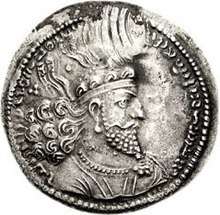Hormizd I
| Hormizd I | |
|---|---|
|
King of Kings of Iranians and non-Iranians Great King of Armenians[1] | |
 Coin of Hormizd I. | |
| Shahanshah of the Sasanian Empire | |
| Reign | May 270 – June 271 |
| Predecessor | Shapur I |
| Successor | Bahram I |
| Born | Unknown |
| Died |
June 271 Unknown |
| Issue | Hormozdak |
| House | House of Sasan |
| Father | Shapur I |
| Mother | Xwarranzem or Kurdzad |
| Religion | Zoroastrianism |
Hormizd-Ardashir, better known by his dynastic name of Hormizd I (Persian: هرمز یکم), was the third shahanshah (king of kings) of the Sasanian Empire from May 270 to June 271.[2] He was the youngest son of Shapur I (240–270/72),[3] under whom he was governor of Armenia, and appears in his wars against Rome (Historia Augusta, Trig. Tyr. 2, where Nöldeke has corrected the name Odomastes into Oromastes, i.e. Hormizd).
Origins
In the Persian tradition of the history of Ardashir I (226–240 [died 241/42]), preserved in a Pahlavi text (Nöldeke, Geschichte des Artachsir I. Papakan), Hormizd I is made the son of Gurdzad, a daughter of Mihrak, a Parthian dynast, whose family Ardashir had extirpated because the Magi had predicted that the restorer of the empire of Persia would come from his blood.
According to legend, Gurdzad alone was saved by a peasant; Shapur I saw her and made her his wife, and afterwards her son Hormizd I was recognized and acknowledged by Ardashir. Hormizd also had three brothers named Bahram I, Narseh, and Shapur Mishanshah. Although he was younger than some of his brothers, he was designated as Shapur's heir because of his prominent descent from his mother's side.
Biography
Hormizd is first mentioned during the wars of Shapur I against the Roman Empire. According to Cyrille Toumanoff, Hormizd was appointed as the ruler of Armenia, which he ruled from 251 until his accession in 270. Little is known of his reign. According to the Muslim chronicler Abu Mansur al-Tha'alibi, Hormizd, like his father and grandfather, ruled with justice. He founded the city of Ram-Hormizd, Hormizd-Ardashir, and Dastagird, which would later be used as a royal residence by the 7th-century Sasanian king Khosrau II. Hormizd also campaigned against the Sogdians, where he was victorious, managed to impose tribute, and erect at their border a stone column that they were not allowed to cross. Hormizd then returned to Estakhr where he died after a reign of only one year. Hormizd was not succeeded by his son Hormozdak, but by his brother Bahram I.
References
Sources
- Pourshariati, Parvaneh (2008). Decline and Fall of the Sasanian Empire: The Sasanian-Parthian Confederacy and the Arab Conquest of Iran. London and New York: I.B. Tauris. ISBN 978-1-84511-645-3.
- Shapur Shahbazi, A. (2005). "SASANIAN DYNASTY". Encyclopaedia Iranica, Online Edition. Retrieved 18 March 2014.

Hormizd I | ||
| Preceded by Shapur I |
Great King (Shah) of Persia 270–271 |
Succeeded by Bahram I |
| Wikimedia Commons has media related to Hormizd I. |